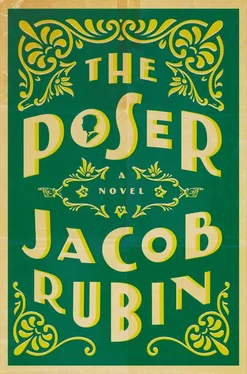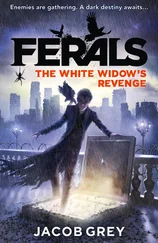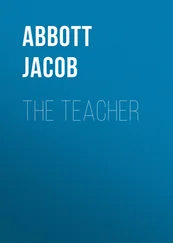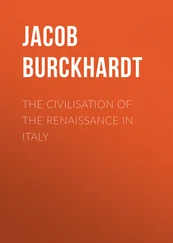Nathan by then was standing behind Mama, attempting to peer over her shoulder. As he did, however, Mama was winding back to strike Bernard again and whacked the mogul on the nose, sending him recoiling. He back-stepped to the rim of a dune and, before any warning could be given, tumbled down it with a shriek.
“Look at him! Is that who you want to be?” Mama said, waving her arm at Bernard. A lock of her gray hair had come unhinged.
The onlookers gawked at me as they had so many times in Sea View. Nathan’s pale, de-hatted forehead was peeking out from the rim of the dune.
“My Giovanni,” she said. “You’re sympathetic to the— ”
“I’m not.” It came out of me. Harry Knott’s voice. The whoosh of traffic out my tenement window. “And don’t say that I am.” I added, “I’ve never been and never will.” My heart beat in my throat, and I turned away.
Bernard by then was stepping into the dune to help Mr. Sharp, the short man brushing sand from his tuxedo pants and yelling in Mama’s direction. His shouts called to assembly several turban-wearing enforcer types who gathered close, ushering Mama out, I gathered from her protestations. Each time she called my name, the sound got farther away. Then she was gone.
Ten minutes later, Max returned. They had her thrown out, he said. She’s standing outside the lot, he said. “We had an agreement,” I said in the right voice. Julie stroked between my shoulder blades.
It was simple enough not to return Mama’s calls over the next couple of days. All this entailed was not picking up the phone. Three days later word came that she had flown back to Sea View. But that night, after the energy of the scene had died, and the sun was turned off, and the fist of stars appeared over the Desert with the big auxiliary fan blowing in a hot and idle wind, I snuck out the back door to the part of the lot where they kept the old sets. There was the frontier town, its row of saloons. Past it stood the cardboard façade of a castle, reachable by a metal drawbridge spanning a drained moat. I jumped up and down on the drawbridge, listening to the tested metallic sound it made. I swallowed a green pill. One that I liked to do was pick a cigarette out of the pack. Bernard did it with two taps. After lighting one, I put it out and tried another. Maybe I tried half a pack because a lot of barely smoked cigarettes were strewn about the drawbridge by the time I was pacing, the gun in my hand. I hadn’t used it, not once, but it helped now and then to take it out and feel its weight. I threw it up in the air and caught it with both of my hands, laughed. Already I was feeling better.
“It’ll be like a movie without cameras,” Bernard said, handing me the speech in the hushed backseat of the town car. Before long we arrived at the fairground where a makeshift stage, festooned with orange bunting, stood before the defunct Ferris wheel. There was an air of frenetic activity behind the stage, a mill of anonymous people excitedly performing tasks.
When the presidential candidate and former senator Rory Stengel finally entered the backstage area, applause traveled swiftly through the crowd. It was a pleasure to watch him smile and greet people and shake his head with warmth and enthusiasm, a head taller than everyone. When he came to me, he held my shoulder and frowned terribly, as if chagrined by gratitude. I don’t remember exactly what he said. Something like, “So glad, really, an honor, we’re gonna thank you for the yes we’re glad.” This was my first time meeting a politician, and it surpassed by far the company of actors. A politician, I learned that afternoon, cannot part with a gesture until he’s blown it up to maximum size. As Senator Stengel thanked me, his face shining with makeup, I began to understand the event. It didn’t matter what my speech said, it mattered only what gestures I made.
The speech itself, as I said, had been written, so, when the time came, all I had to do was stand at the podium and declaim it. Already the crowd thought of me as a kind of hero because of the supposed political undertones of Everyman and No Man’s Land , the second film starring Harry Knott, even more popular than the first. By then I had lived in Fantasma Falls for five years.
I maintained through that time a comprehensive scrapbook larded with articles, profiles, photographs, and puff pieces about Harry Knott. The headlines, in their factuality, pleased me to flip through: THE TOTAL ACTOR, an article about my unflinching commitment, both on film and in life, to the role of Harry Knott; A PATRIOT ONSCREEN AND OFF, a glossy-magazine profile on the extent to which my character’s political views mirrored my own; RETIRED MILKMAN CLAIMS TO EYE REAL BERNINI AT LOCAL BOWLING ALLEY, a small item (among many others like it: one week, it was a garbage man spotting me weeping outside Fantasma Falls Hospital; another, a bus driver claiming I, wearing a hula skirt and blue eye shadow, boarded the M30 at midnight and handed him $200 with stern instructions to drive due east), in which a man named Gary Evershed claimed to spot me “violently cursing a gutter ball” at lane four of the Happy Hall bowling alley; WHO IS SHE NOW? with capsule images of the Julie Darks as they sauntered down the red carpet or emerged from a limousine, along with epithets purporting to describe each woman ( Melanie , a young actress; Tabitha , a nurse and hobby painter); TEN QUESTIONS WITH HARRY KNOTT, a teenybopper questionnaire in which I listed my favorite type of ice cream and the politicians I most admired; THE PRODUCER INSPIRED ENOUGH TO JOIN, a rare profile of Bernard and his choice to imitate the character Harry Knott, moved, as he was, by the character’s patriotic actions on film.
That many of these articles were imprecise or wholly fabricated only enhanced their meaning. If anything, I began to see the scrapbook as an act of preservation, aided precisely by these layers of invention. The lies in them helped protect Harry Knott, in the way Knott concealed my imitation of Bernard, in the way my being Bernard, in turn, helped conserve somewhere, however deep or buried, Giovanni himself, surviving in the scrapbook’s photographs, if nowhere else.
He no longer existed in letters, it’s true. Since the incident at the Desert, I had not written to Mama. For a time she regularly sent her own, claiming to be ill. First her lungs, then an infection in her toe lately replaced by a heart palpitation or arrhythmia that “will be the end of me,” she swore. “If you want to leave it like this, fine. But I’m close to the end. A body knows these things.” I’d called once and knew immediately, from her voice, that she was in fine health, and stopped writing again.
A few days after the episode in the Desert, Bernard had sat me down for a talk at the Chateau Ravine bar. She was trying to sabotage me, he said. However much Mama claimed that she was helping me, that was the exact degree to which she was seeking to destroy me.
Sanctioned by repetition, the theory grew more persuasive. For what, really, had been Mama’s plan in coming to the City all those years before? (There was a delicacy, a succulence to these speculations, insulated from fear by Bernard’s remove.) Why, after all, had she encouraged me to imitate Lucy on Marguerite’s roof, knowing that Lucy was herself at the party and might very well come up at any moment? And even if the resulting row had not been Mama’s strict intention, why, all along, through letters and in person, had she encouraged the pursuit of Lucy’s thread? How could such a search have ended well? And why, really, had she surprised me at the Desert? Was that scene she’d caused with Nathan and Bernard truly an accident? Why had she gone if not to stir up trouble? To throw my career in jeopardy and lure me back home? After all, what had she been doing all my life if not making me dependent on her and her alone? Why had she trained me to seek threads? If not to yoke me to her and separate us, on an island of two, from every other living soul?
Читать дальше












